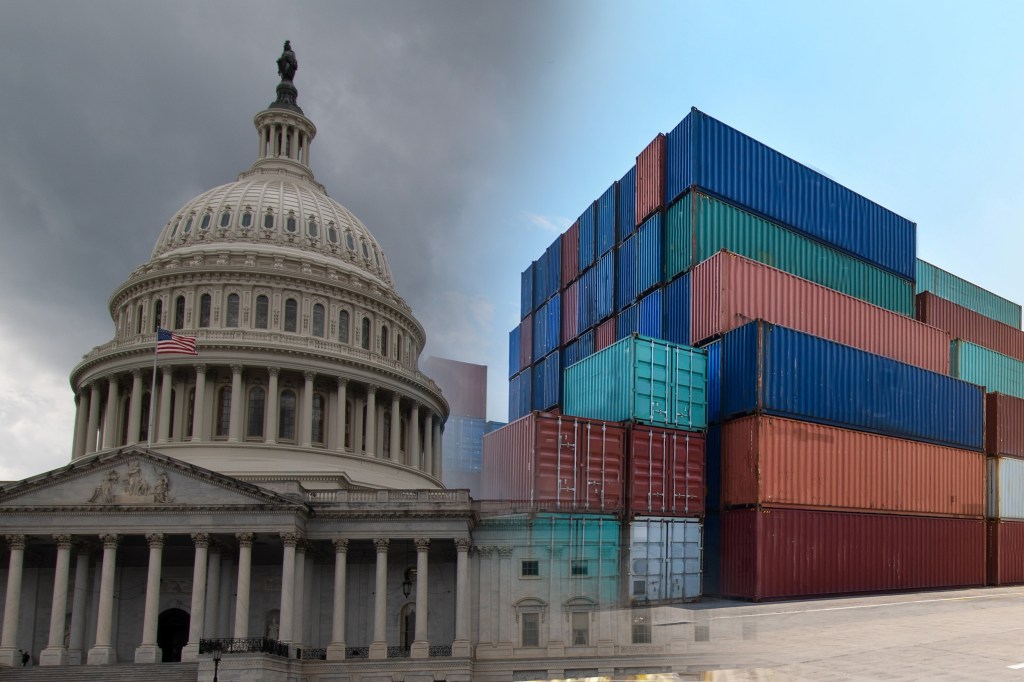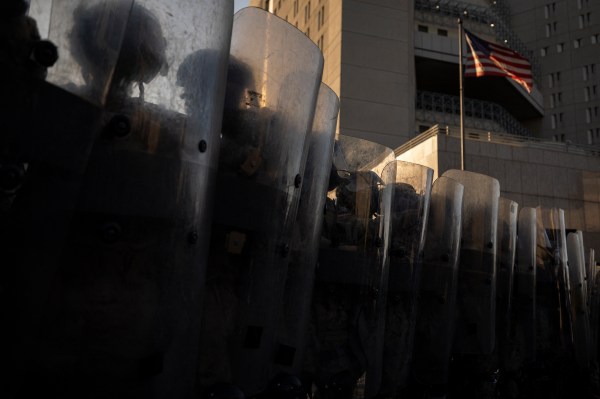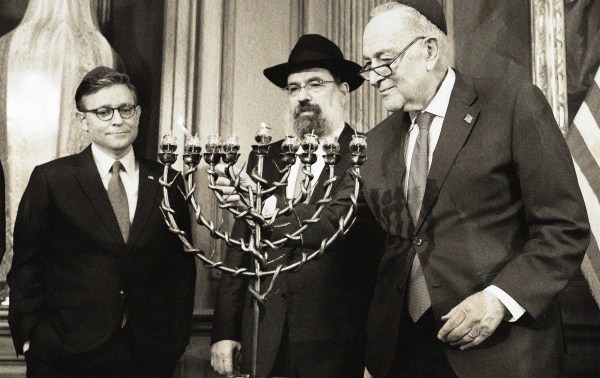President Donald Trump’s tariff saga entered a new chapter last Thursday when the president announced a modified plan for duties on American imports from more than 60 countries. The news came one day before the latest tariff pause was set to expire, and the updated levies are set to go into effect on August 7. But as the president forges ahead in his effort to unilaterally remake global trade, the lawsuits that could grind his tariff regime to a halt are continuing to move through federal court.
Just hours before Trump’s new tariffs announcement, the Court of Appeals for the Federal Circuit heard oral arguments in a challenge to the duties. The Federal Circuit panel of judges sounded skeptical of the president’s claims to expansive tariff authority—a power constitutionally vested in Congress and partially delegated to the executive in only a handful of laws. Depending on when and how the 11-judge panel rules, the Supreme Court could take up the case soon, potentially putting Trump and the judiciary on yet another high-stakes collision course.
As The Dispatch has previously covered on the site and in The Morning Dispatch, there are currently nearly a dozen challenges to Trump’s tariffs working their way through the courts. Thursday’s oral arguments involved the administration’s appeal of a Court of International Trade (CIT) ruling in late May in a case consolidated from two lawsuits, one brought by the Liberty Justice Center, a public interest law firm, that represents small businesses affected by the tariffs and the other by a coalition of a dozen Democratic state attorneys general. The ruling held that Trump’s tariffs—including the April “Liberation Day” measures and earlier “trafficking tariffs” imposed on Canada, Mexico, and China to ostensibly combat human and drug trafficking—exceeded the president’s statutory and constitutional power. The CIT issued a permanent nationwide injunction against the tariffs, which the administration quickly appealed.
The case and Thursday’s oral arguments center on the International Emergency Economic Powers Act (IEEPA), a 1977 law the Trump administration has invoked to levy the tariffs. The law empowers the president to deal with foreign threats and emergencies using tools like economic sanctions, embargoes, freezing assets, or reviewing financial transactions. But no president before Trump had used it to impose even targeted tariffs, let alone global duties.
The combined lawsuits challenge Trump’s tariff authority on both statutory and constitutional grounds. The main statutory objection is fairly straightforward: The text of IEEPA does not delegate tariff authorities to the president. Unlike every other statute granting the president power to impose taxes on imports, the words “tariff” or “duty” are nowhere to be found in the law. Consequently, the challengers claim, Trump’s tariff regime rests on a nonexistent authority.
The challengers also advanced several other statutory objections, including that IEEPA powers can only be invoked when dealing with a national emergency and an “extraordinary and unusual threat.” They argue the trafficking tariffs are not sufficiently related to an emergency since they target all goods from Canada, Mexico, and China rather than directly dealing with trafficking. They also argue that the president’s stated “emergency” stemming from trade deficits and used to justify the worldwide tariffs does not constitute a true emergency nor an “extraordinary and unusual threat” since such deficits are a normal reality of global commerce that have existed for decades.
But even if, as the government claims, IEEPA does confer some tariff authority, the challengers argue the vast tariff powers Trump has exercised would run afoul of the Constitution by violating the nondelegation and major questions doctrines. As TMD explained in June:
The former is a legal principle that Congress must delegate its powers according to “an intelligible principle” that outlines standards that courts can use to judge the proper use of the delegated powers. The unspecified and unlimited IEEPA tariff authority claimed by the administration would presumably violate such a doctrine.
The major questions doctrine is based on Supreme Court precedent that Congress must “speak clearly” in statutes used by the executive branch to take action on issues of major national significance. The Supreme Court has cited the major questions doctrine regularly in recent years, including when it struck down the Biden administration’s student loan forgiveness plan and COVID-19 vaccine mandate.
While the CIT’s ruling affirmed the challengers’ constitutional arguments, it largely focused on the statutory question, concluding that IEEPA did not confer the unbounded duties imposed by the president. It stopped short, however, of declaring that no tariff authority whatsoever exists under the law, although a judge in a separate, ongoing case concluded exactly that back in May.
During oral arguments last week, the appellate court panel of 11 judges homed in on whether IEEPA authorizes any tariffs, and if so, how the court could review whether a president has exceeded the limits of such authority. Over the course of nearly two hours, most of the panel scrutinized the government’s statutory arguments, citing the apparent inconsistency between expansive IEEPA tariff powers and Congress’ authority over the tariff schedule. “It’s just hard for me to see that Congress intended to give the president in IEEPA the wholesale authority to throw out the tariff schedule that Congress has adopted after years of careful work, and revise every one of these tariff rates,” Judge Timothy Dyk said.
What’s the administration’s theory of the case? Brett Shumate, a Justice Department attorney, argued that a section of IEEPA enabling the president to “regulate … importation” should be read as including tariffs. To support this interpretation, Shumate pointed to a 1975 case, United States v. Yoshida International, which dealt with 1971 tariffs imposed by President Richard Nixon to address balance-of-payment problems. While the case involved a law that IEEPA later amended and narrowed, the older statute contained the same “regulate … importation” language.
In Yoshida, a predecessor court to CIT affirmed Nixon’s tariffs as part of the president’s power to “regulate … importation” under the earlier law. The Trump administration argued that since Congress later retained that language in IEEPA, lawmakers intended to ratify Yoshida’s interpretation of the preceding statute in the new law, and therefore, Trump’s tariffs are authorized under current trade legislation. “Congress was aware of Yoshida [and] understood that by incorporating that exact same language, it would be authorizing the president to use IEEPA to impose tariffs,” Shumate told the panel.
The challengers strongly disagreed with that argument, emphasizing that at the time, Congress wanted to narrow the president’s power under the predecessor statute. Neal Katyal, who delivered LJC’s oral arguments, also reasoned that if the Trump administration wanted to embrace the Yoshida interpretation, then it would also need to reckon with limits on tariff power recognized in the 1975 ruling. “If you want to live by the sword of Yoshida, you’re going to die by the sword of Yoshida,” Katyal said.
Nixon’s tariffs were broad but temporary and deferred to the congressional tariff schedule at the time, whereas Trump’s tariffs override the schedule and don’t specify a limited duration. Indeed, the court in Yoshida explicitly noted that upholding Nixon’s surcharges “is not to approve in advance any future surcharge of a different nature, or any surcharge differently applied or any surcharge not reasonably related to the emergency declared.”
The judges appeared skeptical that Yoshida helped the government’s case. “You have to buy all of Yoshida, and it seems pretty clear, to me, that Yoshida is telling us that ‘no, the president doesn’t have the authority to rewrite the tariff schedule,’” Judge Raymond Chen said.
The panel seemed particularly concerned that accepting the Trump administration’s arguments would give the president effectively unlimited tariff power not subject to judicial checks. The courts have often deferred to the president’s discretion on issues of foreign affairs and national security, and the administration maintained that IEEPA’s internal limits on the president’s power—including whether the declared emergency is in fact an emergency or whether the circumstances at hand are “unusual and extraordinary”—are largely unreviewable by the court.
“If they’re not reviewable, how are they limits?” Judge Leonard Stark asked of the requirements for exercising IEEPA power. Shumate argued that Congress can check the president by voting to overturn an emergency declaration.
After the arguments, Katyal said he was encouraged that the panel focused on the danger of unreviewable tariff authority under the pretext of an emergency. “If President Trump can do this, then what’s to stop a future president from doing anything in an unlimited way?” he asked. “Can a future Democratic president declare a climate emergency and tariff goods 1,000 percent from oil-producing countries, because he wants to stop the climate crisis?”
Per Katyal, there are now three potential outcomes for the case: The appeals panel could affirm the CIT’s rejection of the tariffs based on statutory grounds, constitutional objections, or a combination of both; the panel could fully overturn the CIT ruling and side with the Trump administration; or the case could be sent back to the CIT to consider more issues or facts. If the court affirms or rejects the CIT ruling, either of the parties could appeal to the Supreme Court, and some legal observers expect the high court to be the final destination for the case. In the meantime, the challenged tariffs will remain in effect at least until the appeals court panel issues its ruling.
“It is hard to predict what exactly the Federal Circuit will do here,” said Ilya Somin, a George Mason University law professor and co-counsel for LJC. “But I am tentatively optimistic that the court will at least reject claims that IEEPA gives the president virtually unlimited, unreviewable tariff authority.”










Please note that we at The Dispatch hold ourselves, our work, and our commenters to a higher standard than other places on the internet. We welcome comments that foster genuine debate or discussion—including comments critical of us or our work—but responses that include ad hominem attacks on fellow Dispatch members or are intended to stoke fear and anger may be moderated.
With your membership, you only have the ability to comment on The Morning Dispatch articles. Consider upgrading to join the conversation everywhere.